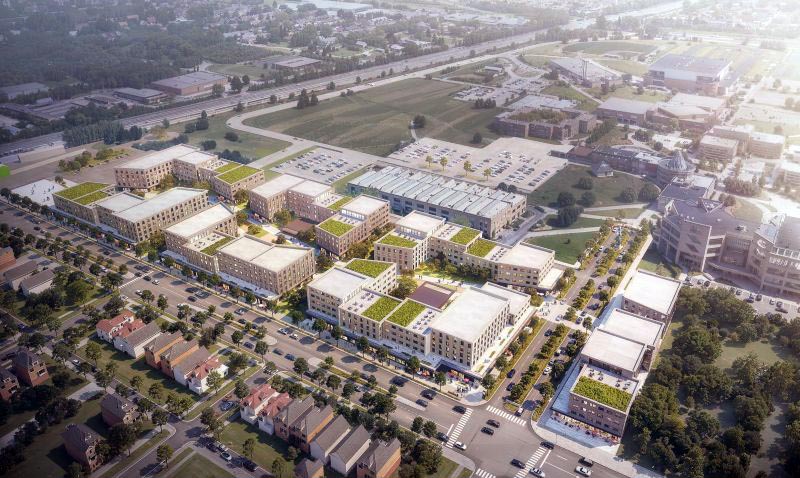Chicago State hopes to make a college town out of 95th Street
Chicago State University, which is now set back from its neighborhood by broad lawns along 95th Street, is offering up some of that green space to developers who would create a college town feeling, with apartments, shops and restaurants.
The state-funded institution in Roseland, almost 160 years old, in late July issued a request for proposals to build the first phase of what it calls University Village 95, which would have up to 528 student beds — all rental — and 25,000 square feet of retail space.
It's "a new front door to our campus," CSU's president, Zaldwaynaka "Z" Scott, said in published materials about the plan.
 A rendering of the complete buildout shows the south side of 95th Street lined with
three- to five-story buildings from Cottage Grove Avenue nearly half a mile west to
Dr. Martin Luther King Drive, in front of the existing CSU buildings. In the rendering
at the top of this story, the cluster of green-roofed buildings is University Village
95, with CSU's existing buildings in the rear.
A rendering of the complete buildout shows the south side of 95th Street lined with
three- to five-story buildings from Cottage Grove Avenue nearly half a mile west to
Dr. Martin Luther King Drive, in front of the existing CSU buildings. In the rendering
at the top of this story, the cluster of green-roofed buildings is University Village
95, with CSU's existing buildings in the rear.
“University Village 95 is more than a real estate project. It’s a commitment to equitable development through real estate investment,” Andrea Zopp, chair of the CSU board of trustees and former CEO of World Business Chicago and deputy Chicago mayor, said in a prepared statement.
"It's the best thing that has happened here since they built Chicago State University" in the early 1970s, Perri Small told Crain's. Her grandparents lived across the street from the campus at the time, and she is now the third generation living in the house. A retired journalist and WVON-AM/1690 talk-show host, Small has no affiliation with CSU or the proposed developments.
"Why shouldn't it be like the neighborhood around North Park University," 20 miles north on Foster Avenue, Small said. "Look at the restaurants and stores there. It's a no-brainer to do it here."
The RFP, issued by the school and CBRE, points out that CSU, the state's only four-year, predominantly Black school, generates $1.6 billion in economic activity.
The document touts not only high demand for student housing in the neighborhood, but the coming of a $56 million Metra station rehab and the Chicago Transit Authority's $5.75 billion Red Line extension project, as well as the appeal of nearby Pullman National Park and the planned quantum campus on the old South Works steel mill site.
In the first phase, the school is offering developers long-term ground leases on CSU-owned parcels. The developers' proposals must include their financing plan, design and timeline.
The project is expected to go in four phases. A CSU spokesperson said a market study by development advisory firm SB Friedman found demand for at least 1,000 new beds.
In 2023, CSU published an economic development plan for the 95th Street corridor. The plan calls for developing hundreds of units of housing, from studios to family-sized units, to create a "college town experience" that is lacking in the mostly commuter school now.
It also calls for fostering arts outlets and retail stores, improving public safety and developing green spaces that invite community use.
Adding street-level bookstores and coffee shops with apartments above to the north edge of the CSU campus "all sounds so good," Small said, "and it's long overdue." As it stands now, "you have to be intentional about going and finding your coffee shop and your bookstore" in other South Side neighborhoods.
A 2024 market report the school commissioned echoed that sentiment, finding that over $324 million in local spending is going to businesses outside the community.
The study, the CSU spokesperson said, found that keeping those dollars local could support three to five full-service restaurants and about the same number of snack shops, a bookstore and a "general merchandise" store.
A lively strip like what CSU envisions 95th becoming, Small said, would clearly boost the surrounding housing market.
It could also increase the appeal of CSU, which, as Crain's reported in June, saw its enrollment drop by more than 70% in the 21st century, from 4,900 in 2004 to a little more than 1,400 in 2024. Amid reduced state funding that has forced tuition increases, CSU has struggled financially in recent years. In 2023, the faculty, who were among the lowest paid at the state's higher education institutions, staged a 10-day walkout.
In May, Scott, CSU's president, told the Chicago Sun-Times that Trump administration cuts were costing her institution a "devastating" $5 million.
Serving up unused slices of its 161-acre campus for privately funded development could help stabilize the school's future. It has a long past, dating to the 1867 launch of a teacher-training institution, the Cook County Normal School, in Englewood. Branches of that school became both Chicago State and Northeastern Illinois University, on the Northwest Side.
Chicago State University, which moved onto the 95th Street campus in 1972, over the years has educated some distinguished figures, at this location and the prior one.
Among them are three founding members of the rock band Styx, as well as YE (formerly known as Kanye West), who did not graduate; long-serving U.S. Rep. Danny Davis, who announced his retirement last week; and Mamie Till-Mobley, the mother of Emmett Till.

 All Rights Reserved
All Rights Reserved